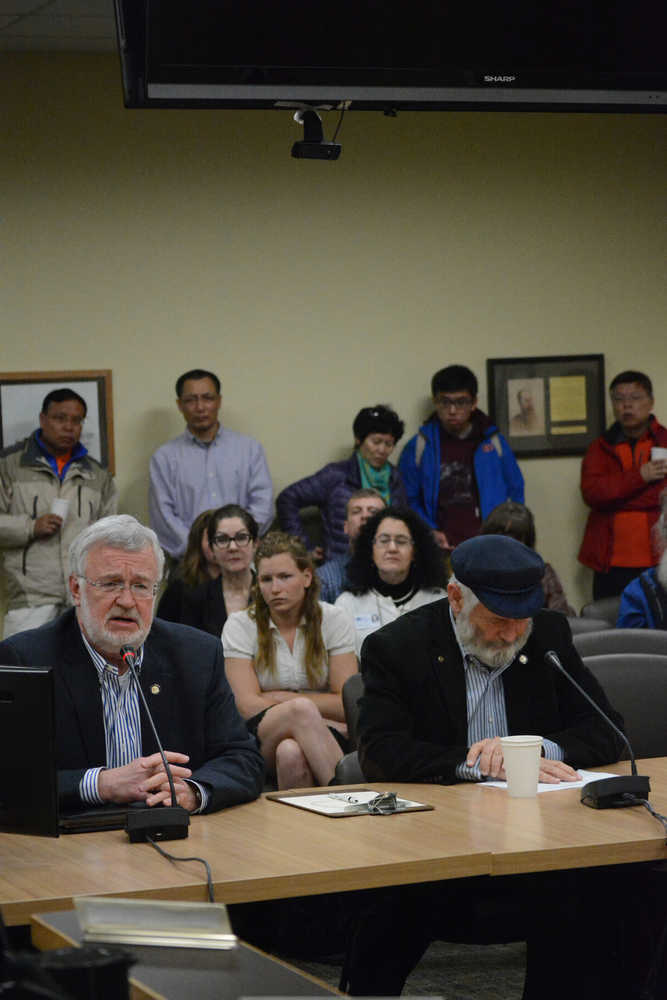With the Alaska Legislature still in recess and leaders trying to craft a balanced budget, it all comes down to a compromise, Sen. Gary Stevens, R-Kodiak, told the Homer City Council on Monday night. Stevens and Rep. Paul Seaton, R-Homer, reported on the results of the 2015 Legislature. The lower Kenai Peninsula’s senator and representative also held a Town Meeting on Monday.
In a normal legislative session, that compromise would be between the House and Senate, and worked out by the Republican Party, which has majorities in both bodies. The 2015 Legislature is anything but normal.
“We’ve never faced a $7 billion deficit over two years,” Stevens said.
The Legislature passed a budget that would keep the state going for six months. Gov. Bill Walker said no, the Alaska Constitution requires a balanced budget, and he called the Legislature back into special session. The Legislature then declared a recess, with most members going home. The hitch is that to pass a balanced budget the Legislature needs to take money from the Constitutional Budget Reserve. To do that requires a three-fourths vote in both bodies. In the House, that means votes from Democrats, and the minority has been making demands, Stevens said.
“A compromise is what needs to happen to get the House and Senate together,” Stevens said. “It’s going to cost us some money to get a Democratic vote.”
Seaton said it’s a difference in philosophies that’s driving the budgetary problem. The Senate took out money for the base student allocation paid to school districts. The House put some of that money back. Democrats want more money for education, more money for early childhood learning programs, money for cost-of-living allowance raises for state workers, and to pass Medicaid expansion and Erin’s Law. Erin’s Law would require age-appropriate education on issues like sexual abuse and sexual assault.
Walker and Seaton both support Medicaid expansion. Seaton passed out an analysis showing how much the state would save if it passed Medicaid reform and expansion. Just reform would save $16 million a year or $69 million over five years. Reform and expansion would save $329 million, Seaton said. That’s even if 100 percent of an estimated 42,000 people ages 19 to 64 enrolled. At 63 percent enrollment, that’s $1 billion that goes into the health care system, Seaton said.
“That translates into a lot of jobs,” he said.
Stevens and Seaton also talked about the other side of balancing the budget: increasing revenues. Stevens noted that there’s about $10 billion left in the constitutional budget reserve, giving the state about three years to address how it’s going to fund government if oil prices and production don’t improve.
“We have to be careful. At some point we’re going to run out of savings,” Stevens said.
Seaton has proposed a state income tax and an increase in the corporate income tax, but neither idea went anywhere this session.
Council member David Lewis noted one problem with cuts in spending: It’s not hitting the oil companies. He gave credit to Seaton for his tax revenue ideas, and said he’s OK with an income tax as long as everyone takes a hit.
Stevens said he and Seaton both opposed Senate Bill 21, the oil and gas tax measure that voters supported in the August primary last year.
“We’ve taken a very strong stance, both of us, of fighting back against big oil,” Stevens said.
With the current tax structure and with credits to the oil companies, the credits are more than the state gets from the oil industry, Stevens said — even if the price per barrel of oil went up to $100.
Seaton said Walker has called for a conference of Alaskans to be held June 5-7 at the University of Alaska Fairbanks to discuss revenues.
“All of these issues of revenues as well as oil taxes and credits will be on the table,” Seaton said. “It was all focusing on cuts. Everyone knows cuts can’t do it. We need to look at diversity of revenue.”
Michael Armstrong can be reached at michael.armstrong@homernews.com.


